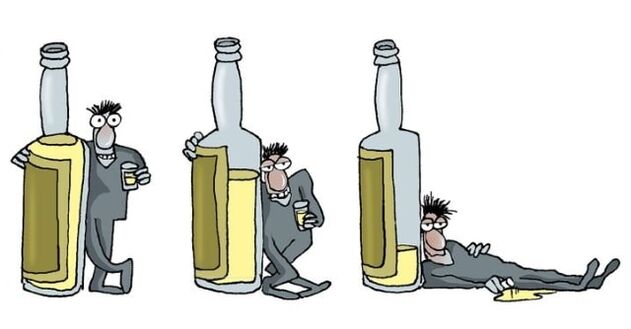Statistically, men are twice as likely to become addicted to alcohol. Our society considers frequent alcohol consumption perfectly normal, although the consequences of alcoholism in a man are deplorable for both him and his family.
This opinion is of course harmful and should be reconsidered. Alcoholism is a serious illness that takes a toll on a person's morale and general health. It requires a holistic medical approach. As practice shows, even beer leads to steady alcoholism. It was with him that the disease began, and then a person turned to strong alcohol.
External signs of alcoholism
Addiction forms and develops gradually, step by step. The presence of alcoholism and its development can be recognized by some of the characteristic signs of alcoholism in men. Psychologists and narcissists have developed the main symptoms by which one can recognize alcoholism in the beginning:
- irresistible craving for alcohol, a person who is looking for the strangest reasons to justify his desire to drink;
- aggression towards family members, friends, work colleagues;
- lethargy and fatigue;
- language disorder;
- disorders of the musculoskeletal system;
- familiarity in communication with strangers;
- lethargy, mood swings;
- general decline in health.
These are the first signs of early stage alcoholism, which can last up to 10 years. It is easy to miss them at this stage, as they often do. The woman just didn't notice them. Think of a man de-stressing after work, trying to get out of trouble with a can of beer or a glass of brandy. Meanwhile, the disease does not stand still, but continues to progress.
Causes of alcohol addiction in men
Men's problem of alcoholism is regulated by the difference between the psychology of women and men. Men are less well-adapted to changing external conditions and use alcohol as a way to distract from the problems and worries that are pouring over them. In addition, men are often resistant to persuasion to undergo rehabilitation, believing they can cope on their own.
But this is not the case - in addition to physical dependence, alcoholism brings about profound personality changes from the very first months of abuse. The external environment often over time includes the same alcoholics, which also prevents the healing process.
Every second family in our country will face the problem of alcoholism in the future, or have faced it. This affects all family members without exception, especially children. In general, the reasons for the occurrence of this dependence can be divided into three categories:
- society;
- mentality;
- physiologic.
They may appear individually or in combination. Social reasons include the presence of drinking buddies in the environment. Social status plays a special role, as people with better jobs and higher education are less likely to face addiction problems. It is especially necessary to highlight the presence of stress at work, the level of happiness.
Psychological factors are:
- psychological imbalance;
- insufficient degree of autonomy;
- less motivated to develop professionally and mentally;
- the presence of complexes;
- low self-respect.
There are several other factors that can lead to alcoholism in a man. These are just the most popular ones.
There is another group of factors that cause persistent intoxication - those of a physiological nature. These are metabolic disorders that lead to a rapidly developing addiction and genetic predisposition. If there are cases of alcoholism in previous generations, it is likely that they will be related to the descendants of the next generation. A person thinks that he will not be addicted, and he can easily quit drinking at any time. A similar phenomenon is characteristic of alcoholics at all stages of alcoholism.
You can recognize an alcoholic by his eyes and look. Ethanol has a bad effect on the eyes, they become "vitreous" and tired. Over time, bags under the eyes and puffiness appear. Such a person looks so tired. This indirectly indicates the presence of diseases of internal organs.
From someone who is a regular drinker, often smells of "smoke" alcohol, it is difficult to mistake for any other person. People with alcoholism often do not take care of their hygiene, appearance, and are not afraid to wear wrinkled, dirty clothes.
Stages of alcoholism and their signs
There are several episodes of alcoholism in men. Only three of them, one after another. The later the treatment, the harder it is to achieve success - psychological dependence and a socialist lifestyle will affect the progress of treatment.

Signs of the first stage
In the early stages of alcoholism, a gradual increase in alcohol intake is characteristic. There are many reasons for this, such a person begins to look for any reason to drink. At the same time, each time getting drunk more and more. Relatives may hear excuses for this behavior:
- I want to relax.
- Others drink more than me.
- Yes, I drink a lot, but I'm not an alcoholic.
- I'm just tired at work and I want to rest.
If these phrases are accompanied by aggression, this is a clear sign of developing an addiction. In addition, this stage is characterized by other physiologically relevant signs:
- no gag reflex;
- more and more is required to achieve the same level of intoxication;
- there is a power failure.
All these manifestations cause general health decline, poor ability to focus attention and reduced work efficiency. They appear more often during the transition to the next stage.
At this stage, it is necessary to start treatment for alcoholism in a man - the earlier this stage, the greater the likelihood of success. In the early stages, drunkenness is completely cured and the body after recovery will restore to its original state, because the organs do not have much time to be affected and their functions are not impaired. a lot of.
A person cannot imagine his life without alcohol. This is how he spends all his free time. As a result, problems can arise in the workplace, when employees often feel worse at work. As a result, conflicts with colleagues and management begin. There are also many problems in family life.
Signs of the second stage
In the second stage of alcoholism in men, other characteristic signs appear. Withdrawal or hangover symptoms are more obvious here. It includes nausea, headache. There may be a power outage. Sleep and digestion are often disrupted. If you have a craving for alcohol, you can't resist. Stage two alcoholics are no longer able to quit drinking. She is the main priority that all life revolves around.
In addition, this stage of the disease is characterized by psychosis - alcoholic psychosis. This is manifested in an unstable emotional state, often with aggressive expressions, inappropriate behavior and lack of legitimacy.
Signs of the third stage
This is the final stage of alcoholism. At this stage, hospitalization is urgently needed to save the patient's life. A complete deterioration of personality and moral values becomes indifferent. The main goal of an alcoholic is to get a new portion of alcohol and for the sake of it he can do anything, including breaking the law. It also happens:
- intoxication comes from small doses;
- very difficult hangover feeling;
- Sleep depends on the amount of alcohol drunk, as well as the amount of food.
According to medical statistics, the average life expectancy of an alcoholic at this stage is no more than five years. Due to the constant poisoning of the body, the following symptoms may appear:
- intellectual deterioration;
- inability to speak or severe disturbance in it;
- high risk of stroke, heart attack, paralysis, severe liver and kidney dysfunction.

If these symptoms start to appear, you need to understand that the addiction is just developing. The basis for effective and successful treatment is the individual's desire to get rid of the addiction. The situation is complicated by the fact that alcoholics are often drunk and unable to make informed decisions. This greatly complicates the dialogue with such a person.
Alcoholism needs special attention. Nowadays, this problem is gaining more and more weight in society. As a rule, many people believe that beer cannot cause alcohol addiction. Andrologists have a different view on this - regular beer drinking can cause persistent alcohol addiction. He expressed the need to drink this drink constantly, and in large quantities. Gradually, the amount of alcohol increased. In this case, it is also advisable to raise the alarm and begin the recovery process to get rid of this addiction.
Consequences of alcoholism in men
No matter how strong the body is, the consequences of alcoholism in a man will not last long. They can be divided into two categories - psychological and physiological. The latter can manifest itself in disorders of the functioning of various body systems:
- Men are powerless. Under the influence of alcohol, hormones change, testosterone production is interrupted.
- Digestive system problems. It can be gastritis, intestinal ulcers, stomach diseases.
- Pressure problems. Alcohol destroys the vascular system.
- Liver disease. Regular alcohol consumption will lead to cirrhosis and liver cancer.
- Poor immunity. The body loses its protective properties, infectious diseases often occur.
- Cardiovascular problems. The likelihood of a heart attack in alcoholics is several times higher than in non-drinkers.
Alcoholism also affects the human psyche. These violations can manifest in strange behaviors:
- Feeling abused. To one person, it seemed as if he was being watched.
- The appearance of hallucinations. Under the influence of alcohol, the brain can create visual and auditory hallucinations.
- Encephalopathy. It is associated with poor circulation and poor nutrition of brain cells.
If such phenomena appear, you should immediately contact a competent psychologist who works with alcoholics. It is important to know that you can begin treatment for alcoholism in men at any stage.
Steps to restore
- Step 1. Contact a specialist clinic
- Step 2. Convince addicts to get treatment
- Step 3. Detoxification (cleansing the body of toxins)
- Step 4. Comprehensive recovery at the inpatient treatment center
Only at a rehabilitation center, a man is not only helped to relieve his psychological dependence but also completely cured with the support of inpatient treatment, accompanying the first steps in life. life after rehabilitation.
Of course, the sooner you get qualified help from narcissists, the quicker and easier the process of getting rid of this disease. Therefore, if you have the slightest doubt, immediately contact a specialist.


























